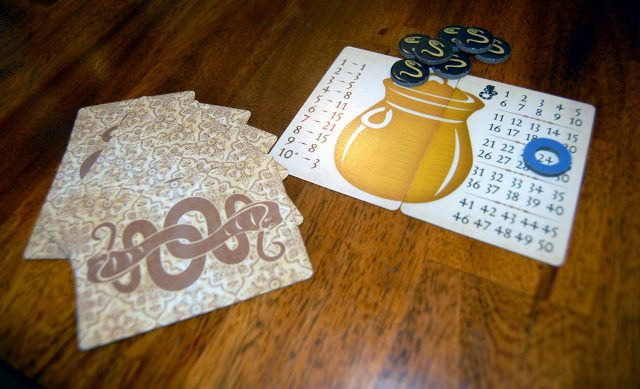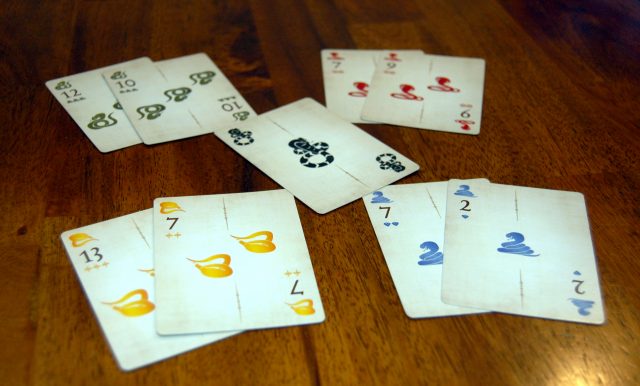Trick-taking card games are not often associated with higher player counts, but the exceptions to that rule tend to leverage a common element: players commit to winning a minimum number of tricks, but then must back up their claims or suffer the consequences. The design team of Chris and Suzanne Zinsli were wise to pick up on the effectiveness of this push-your-luck gameplay in trick-taking games, as they successfully implemented it with a new twist into their 2017 design Cobras. The end result is a tight trick-taking experience that also happens to play beautifully with a full complement of five players.
Push-your-luck in Cobras does not focus on the total number of tricks you want to win, but rather when you want to win tricks and when you want to lose them. Players are awarded victory points on an finely-tuned scale, based on results of prior tricks. Lost tricks reward players with cobra tokens, but a winning trick is what allows a player sell off all of their tokens for points.
 A perfect sale of seven cobra tokens is rare, but when players are off by one or two cobras, they are still given enough points to encourage players, rather than punish them harshly. The forgiving scale also open up the range of situations where it may not be clear whether a player should or should not pursue a trick. These turn-by-turn decisions make Cobras an incredibly tactical game, but one that still has plenty of strategy to guide the implementation of such tactics.
A perfect sale of seven cobra tokens is rare, but when players are off by one or two cobras, they are still given enough points to encourage players, rather than punish them harshly. The forgiving scale also open up the range of situations where it may not be clear whether a player should or should not pursue a trick. These turn-by-turn decisions make Cobras an incredibly tactical game, but one that still has plenty of strategy to guide the implementation of such tactics.
When it comes to strategy, two unique elements separate Cobras from the rest of the pack. First is the presence of a one-time-use “king cobra” card that allow a player to preemptively declare whether they will perform the winning or losing action at the conclusion of a trick, regardless of the true result. Each player’s hand is seeded with on king cobra, and the presence of this tool keeps players from getting too reckless with the push-your-luck accumulation of cobra tokens, since players retain some degree of control over their fate. However, a strategic choice must be made in whether to deploy the king cobra earlier or later in a round.
An early play of a king cobra can be effective in setting up the perfect sale, but it leaves a player exposed for the remainder of the round. Without the king cobra, a player may not have the ability to win any future tricks to sell off their cobras, meaning they are going to get taken on a ride of cobra token accumulation. Rounds do eventually end, however, and any unsold cobra tokens cost their owner one victory point. Sticking another player with an overflowing basket of unsold cobras is extremely satisfying.
 The second unique and strategic aspect of Cobras is the ability it hands players to manipulate the game’s turn count. Rather than playing for a defined number of tricks, Cobras uses its high-value cards as a timer. Once ten of them hit the table, play concludes, with scores carried over into the following game. You can be certain that every player going into a round with a set a strategy on how long that round should take to end.
The second unique and strategic aspect of Cobras is the ability it hands players to manipulate the game’s turn count. Rather than playing for a defined number of tricks, Cobras uses its high-value cards as a timer. Once ten of them hit the table, play concludes, with scores carried over into the following game. You can be certain that every player going into a round with a set a strategy on how long that round should take to end.
All of the above elements are tied together with one of Cobras’ less unique features, but one that is greatly appreciated by the players at the table. Cobras requires continued replay of the game until one player’s accumulated score crests a predefined threshold. While this is certainly not new territory for games, Cobras comes onto a scene where players are increasingly feeling burnt out in their attempts to keep pace with new releases, so the use of a forced repeat-play mechanic here is indeed noteworthy. Gamers should only be getting more mileage out of their purchases as game design improves, not less, so kudos to the Zinslis for forcing the issue with Cobras.
Comments
No comments yet! Be the first!